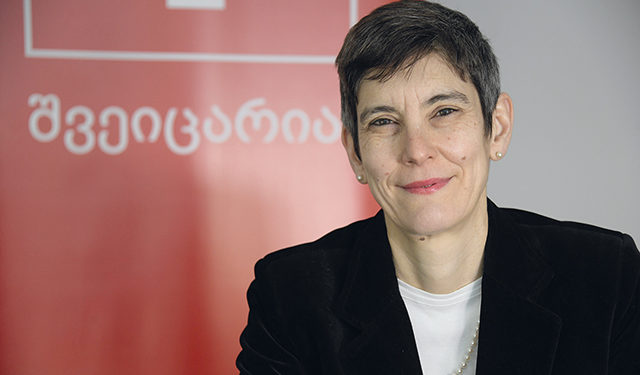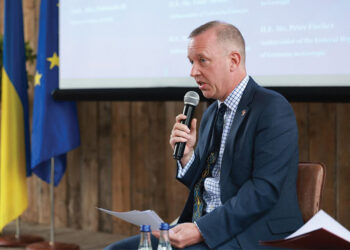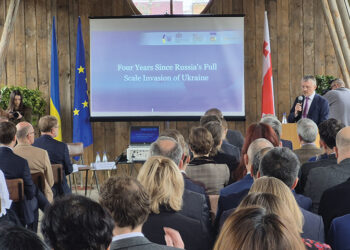Op-Ed by Danielle Meuwly, Regional Director of Cooperation, Embassy of Switzerland.
This year, we will be marking International Women’s Day with the bitter realization that the gains achieved over the last decades in our efforts towards gender equality and women’s empowerment remain fragile. The pandemic has exacerbated the unequal division of unpaid domestic and care work between women and men. It has shown how vulnerable and insecure women’s employment is, and how perilous the situation of victims of domestic violence can get as lockdown measures were implemented. While the fragility is not only COVID related, the pandemic has poignantly highlighted the significance of women’s contributions to society in so many areas: as healthcare workers, care-givers, or community organizers to name just a few. They have clearly demonstrated, once again if it was needed, their potential for leadership.
It is therefore important for all of us to embrace the global priority theme articulated by UN Women for the 2021 International Women’s Day: the increased participation of women in leadership positions, with a view to achieve an equal future in a COVID-19 world. The theme is aligned with the 65th session of the Commission on the Status of Women and with the flagship Generation Equality campaign, to which many states worldwide have already adhered. The Swiss Cooperation stands in solidarity with civil society organizations, women’s rights activists, the government, the UN, and other development partners in our shared aspiration of achieving gender equality as we mark this International Women’s Day and remember the battles we won, as well as those still ahead of us.
Efforts are being made to achieve SDG 5, which are at the core of Switzerland’s cooperation program in Georgia. For over a decade, we have been supporting women’s economic empowerment through value-chain development projects in the agriculture sector (“Alliance Caucasus Program”). We helped women producers of meat and dairy products, wool, and honey to improve the quality and quantity of their goods and access to the markets; this has created more than GEL 50 million in additional income since 2017.
Efforts are being made, but there is still some way to go, in particular to raise awareness. For example, women’s participation is ensured by the Decentralization Strategy, and a number of guidelines for conducting community meetings for the development of municipal planning documents. Women have the full right to participate in this process, but they often still do not know about it, or still doubt that their participation can make a difference. Together with our implementing partner, Mercy Corps, we supported the opening of Women’s Rooms in many partner municipalities, with municipal buildings offering a resource space and access to public services to women. The first three rooms were opened in Kvemo Kartli in 2012. There are now about thirty in various regions of Georgia. National guidelines are ready. Once approved, they will ensure consistency among these Women’s Rooms as well as the quality of the services offered.
The Swiss Cooperation also takes particular pride in the Gender Pay Gap Analysis for Georgia, undertaken by us with Austria as a co-funder, within the UN Women-implemented project on “Women’s Economic Empowerment in the South Caucasus.” The findings have provided solid data and convinced the Government of Georgia to start advocating for an end to gender-based discrimination in the labor market. The principle of equal pay for equal work has been adopted through the amendments of the Labor Code in 2020, and Georgia has expressed its interest in joining the Equal Pay International Coalition (EPIC) in 2020. These are welcome developments. Yet, the monthly Gender Pay Gap at 35.7% in 2019 has only marginally declined in Georgia since 2013 when it stood at 36.5%. Obviously, more should be done to reach the goal of equal pay, notably by ensuring that national legislation expressly commits to the principle of equal pay for men and women for work of equal value, and that procedures for joining EPIC are finalized. Surely, this agenda would benefit from the commitment to EPIC by important actors, such as Georgia’s Trade Union Confederation, the Employers’ Association, representatives of the private sector, civil society and academia. To succeed, all forces are needed.
This International Women’s Day can only be a symbol, and we need symbols. Gender equality will only be achieved if all make an effort, every day, to implement it. There are many opportunities to do so. For example, this year ‘Ring the Bell for Gender Equality,’ will take place – virtually – on 11 March. It will be hosted by the Georgian Stock Exchange in cooperation with our partners IFC and UN Women as a call to the private sector to take concrete actions to advance women’s empowerment and gender equality. Please take part.
Op-Ed by Danielle Meuwly, Regional Director of Cooperation, Embassy of Switzerland














